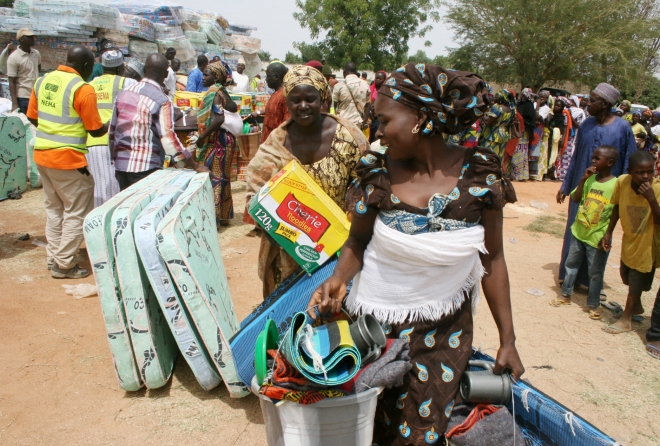About 7, 000 Nigerians evicted from their Gomboru Ngala homes in Borno State by the Boko Haram insurgency have returned after almost one and a half years of exile in neighbouring Cameroon.
On hand to receive them was the Chairman of the Local Government, Alhaji Abdulrahman Abdulkarim, who distributed relief materials to them.
A similar gesture was extended to those still taking refuge in Fotokol, Cameroon.
Each family was given a bag of rice, grain, oil and condiment.
Abdulkarim described the situation in Gamboru as pathetic with many houses burnt and uninhabitable.
Most of the returnees are currently being accommodated by those whose houses survived the Boko Haram onslaught.
“Although almost all our homes are burnt but they agreed to share houses with their neighbors and they are ready to protect themselves from any attack,’’ he told reporters in Maiduguri.
He called for the deployment of paramilitary personnel to secure the borders ”so that whoever wants to come in will be screened.”
He added: “Our people are ready to support the security agencies. In fact the military men on ground are doing a good job there.
“We have more 7000 people that have returned as at last Thursday and more people are still coming. In fact they are eager to come back to come.”
Boko Haram insurgents invaded the border town in August 2014 killing hundreds of the residents.
Over 50,000 residents were forced to flee to Cameroon, Maiduguri and Adamawa states.
Nigerian troops reclaimed Gomboru Ngala five months ago from the militants after the Chief of Army Staff Lt Gen Buratai led top generals and security outfit to raise the Nigerian flag in the town.
The returnees crossed the 300-metre river bridge that forms the border with Cameroon, following calls by military and local leadersý for residents to return.
“We found a looted and burnt out town which is a shadow of its former self,” said Abacha Mari, one of those who returned to Gamboru last Wednesday.
“More than nine-tenths of the buildings in the town have been damaged by fire while ýthe rest has been washed away by the rains,” he added.
“Everything was looted and the streets are barely recognisable.”
Gamboru has been repeatedly targeted in the Boko Haram insurrection, which has cost the lives of 17,000 people in Nigeria and made over 2.5 million homeless since 2009.
Although Boko Haram were forced out of Gamboru 11 months ago, the refugees say they are only beginning to feel confident enough to return because the Nigerian army has sent a large contingent to the town.
The return of the refugees is being coordinated by Cameroonian soldiersý and local officials in Gamboru, the returning residents said.
The Nigerian refugees and their belongings werýe screened at the Cameroonian side of the bridge by soldiers using sniffer dogs to detect explosives before they were allowed to cross back into Nigeria.
Nigerian officials were on hands to welcome them and provided them with the necessary papers for their return.
Returning residents scoured their empty homes in the vain hope of finding any personal ýeffects neglected by Boko Haram.
“Nobody found anything in their homes which have been looted and burnt,” said ýreturnee Ibrahim Wanzan.
The destruction that they found came as no surprise. Some of the refugees had already visited Gamboru under the protection of Chadian soldiers in February 2015 and described it then as a “ghost town”.
A key source of the locals’ livelihood, the market, has also been destroyed.
It formerly attracted traders from neighbouring Chad and Cameroon.
“Our main problem is food and how to rebuild our homes,” Wanzan said.
The returned residents have been living on the food they brought from Fotokol and desperately hope to receive aid from the Nigerian government before supplies run out, Mari said.
The National Emergency Management Agency (NEMA) plans to send aid to Gamboru in coming days.
“We are aware of the return of thousands of Gamboru residents from Cameroon and we are ýworking to send relief items to them in the next few days,” a NEMA official told AFP.






